

Sticking to UK diet advice cuts premature death and CO2 - study. Sticking to official dietary advice, including the five-a-day maxim, could reduce the chance of premature death by an estimated 7% as well as help the environment, a study has suggested.
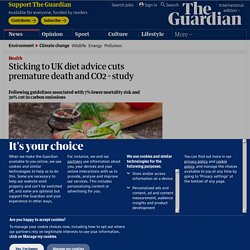
However, it found that while many people are able to follow some of the guidelines, next to no one follows them all. The first analysis of nine government-backed Eatwell dietary guidelines found that those who adhered to five or more of them had an estimated 7% reduction in their mortality risk. The research, led by the London School of Hygiene & Tropical Medicine, in collaboration with the University of Oxford, suggested a similar diet was associated with a 30% reduction in carbon dioxide emissions, compared with those that adhered to two or fewer. “Further adherence to the guidelines would not only result in population health benefits, but is also associated with lower environmental footprint due to reduced greenhouse gas emission.”
Landmark obesity guidelines in Canada treat problem as chronic illness. Pioneering guidelines on obesity management published on Tuesday in Canada are challenging doctors to consider the health problem as a complex chronic illness rather than something a little diet and exercise can cure.
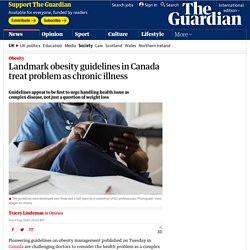
The guidelines – believed to be the first of their kind in the world – were developed over three and a half years by a committee of 62 professionals led by Dr Sean Wharton, a Toronto internist specializing in weight management. The document advocates for approaching obesity as a complex chronic disease, rather than an issue of weight loss. Huge growth in free school meals urged to tackle food poverty crisis. Up to 1.5 million more children in England should get free school meals to help tackle a growing crisis of food poverty and unhealthy eating, according to a blueprint billed as the first national food strategy since war rationing.
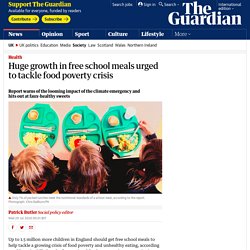
The government-commissioned report also warns that the climate crisis will be the source of the next food emergency, demands more than £2bn for farmers to improve the countryside, and condemns faux-healthy food labelling by big brands - including the idea of “healthy” Marks & Spencer Percy Pig sweets. The author of the strategy, the Leon restaurant co-founder Henry Dimbleby, said Covid-19 had highlighted stark economic, health and nutritional inequalities which are set to be made worse by the pandemic’s economic fallout. He warned that “the wave of unemployment now rushing towards us is likely to create a sharp rise in food insecurity and outright hunger”. Pandemic has exposed Britain's vulnerabilities says food policy review. It is a year since Michael Gove asked the businessman Henry Dimbleby to produce a national food strategy.
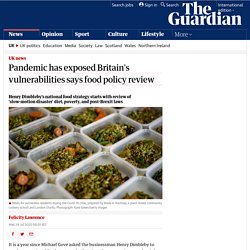
In that time the coronavirus pandemic has brutally exposed the cracks in the British food system so the launch of part one of his review this Wednesday comes in a new and urgent context. After only a few weeks of lockdown three million people in Britain were in households where someone was forced to skip meals and go hungry. As supermarket shelves were emptied our sophisticated supermarket system of just-in-time deliveries suddenly looked very vulnerable to shocks. All this landed amid the EU exit process and as we lose the complex trade and subsidy arrangements that have shaped our food supply. Dimbleby, the entrepreneur who created Leon, the chain that tries to make takeaways healthier and less environmentally destructive, is a smart media performer, as you would expect given the family name. Obesity and coronavirus: how can a higher BMI increase your risk? Less than a year ago, Boris Johnson was taking a stand.
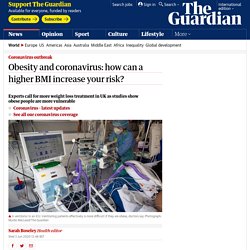
Researchers find a western-style diet can impair brain function. Consuming a western diet for as little as one week can subtly impair brain function and encourage slim and otherwise healthy young people to overeat, scientists claim.
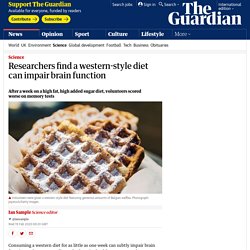
Researchers found that after seven days on a high fat, high added sugar diet, volunteers in their 20s scored worse on memory tests and found junk food more desirable immediately after they had finished a meal. The finding suggests that a western diet makes it harder for people to regulate their appetite, and points to disruption in a brain region called the hippocampus as the possible cause. How ultra-processed food took over your shopping basket. Nearly three decades ago, when I was an overweight teenager, I sometimes ate six pieces of sliced white toast in a row, each one slathered in butter or jam.
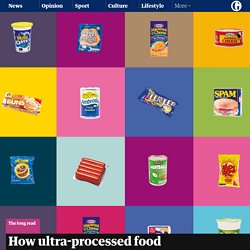
I remember the spongy texture of the bread as I took it from its plastic bag. No matter how much of this supermarket toast I ate, I hardly felt sated. It was like eating without really eating. Adiposity > Data Visualisations > NCD-RisC. Amsterdam's solution to the obesity crisis: no fruit juice and enough sleep. The city of Amsterdam is leading the world in ending the obesity epidemic, thanks to a radical and wide-reaching programme which is getting results even among the poorest communities that are hardest to reach.
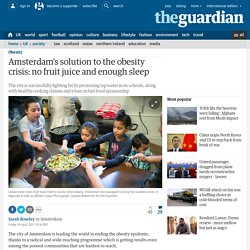
Better known for tulips and bicycles, Amsterdam has the highest rate of obesity in the Netherlands, with a fifth of its children overweight and at risk of future health problems. Article: Body Fat Distribution and Risk of Cardiovascular Disease: An Update. Article: The global epidemic of obesity: an overview. Article: WASH—World Action on Salt and Health. Figure 1 Relative risk for stroke and total cardiovascular disease (CVD) associated with a 5 g/day increase in salt intake.
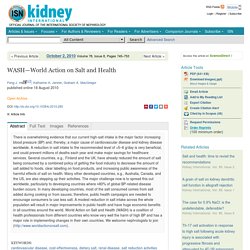
Figure 2 Cumulative incidence of cardiovascular disease (CVD) by salt intervention group in the Trial of Hypertension Prevention (TOHP) I and II, adjusted for age, sex, and clinic. Figure 3 Number of cardiovascular disease (CVD) deaths averted and the financial costs associated with implementation of salt reduction and tobacco control in 23 low- and middle-income countries. Blow to low carb diet as landmark study finds high fibre cuts heart disease risk. Eating more fibre, found in wholegrain cereals, pasta and bread as well as nuts and pulses, will cut people’s chances of heart disease and early death, according to a landmark review commissioned by the World Health Organization.
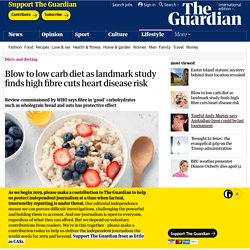
The authors of the review, which will inform forthcoming WHO guidelines, say their findings are good news – but incompatible with fashionable low-carb diets. The research is led by Prof Jim Mann’s team at the University of Otago in New Zealand, who also carried out the major review that informed WHO guidance on curbing sugar in the diet, leading to sugar taxes around the world. Sugar is a “bad” carbohydrate, but fibre is found in “good” carbohydrates such as wholegrain bread and oat-based muesli. However, the overwhelming backlash against sugar has led to popular diets that reject carbohydrates, including the fibrous sort that can, say the scientists, save lives. BMJ editorial on sugar and salt.
Britain Is The ‘Fat Man Of Europe’: So Why Won’t Government Invest In Healthier Food? Ca-Cola to cut 1,200 jobs as consumers turn away from sugary drinks. Cancer rates set to increase six times faster in women than men. Cancer rates will increase nearly six times faster in women than in men over the next 20 years, with obesity partly to blame, experts predict. As several of the obesity-related cancer types only affect women, the growing number of people of both sexes who are severely overweight is likely to have a greater effect on incidence of the disease among women, according to the analysis by Cancer Research UK. Cases of ovarian, cervical and oral cancers are predicted to rise the most. Rates will rise by around 0.5% for men and 3% for women, meaning an estimated 4.5 million women and 4.8 million men will be diagnosed with cancer by 2035.
That equates to projected UK cancer rates increasing by approximately 0.5% for men and 3% for women. Children in England have already reached this year's sugar limit, warn experts. Children in England have already eaten and drunk more than a whole year’s worth of sugar in the six months since January, says Public Health England (PHE). Coalition's voluntary salt limits have been 'public health disaster' Nearly 10,000 cases of heart disease and stroke and 1,500 cases of cancer could have been avoided in England if the coalition government had not switched to a voluntary deal with the food industry to cut salt in food, say researchers.
The Responsibility Deal was introduced in 2011 by Andrew Lansley, then health secretary. The deal asked food and drink manufacturers and supermarkets to volunteer their own pledges to make their popular products healthier, such as by reducing salt and sugar content. Until that time, the Food Standards Agency (FSA) had pushed companies hard to meet specific targets on salt reduction. A paper in the Journal of Epidemiology & Community Health says that under the FSA, from 2003 to 2010, salt intake levels fell by 0.2g each year for men and by 0.12g for women – from an average of 10.5g for men and 8g for women per day in England. But between 2011 and 2014, annual reductions in dietary salt intake slowed to 0.11g for men and to 0.07g for women. 'Diabolical' diets: four in 10 children consume sugary drinks every day. More than four in 10 children drink sugary drinks daily and one in three do not eat fruit each day, according to a global report that warns most countries are unlikely to meet nutrition targets.
Researchers warn the standard of diets around the world is “diabolical”, and that problems such as obesity, anaemia and micronutrient deficiency are being neglected. While progress has been made in tackling child stunting, the report provides the most comprehensive picture of diets globally to date, analysing statistics on exclusive breastfeeding, dietary diversity and the consumption of sugary drinks. “What we highlight in this report is just how important and just how diabolical the state of diets are – whether it’s for infants, young children, adolescents and adults,” said Prof Corinna Hawkes, one of the report’s lead authors, who added malnutrition was a concern in both rich and poor countries.
Despite global efforts to tackle stunting, rates remain high. Food subsidies and taxes significantly improve dietary choices. BOSTON (March 1, 2017)—A new systematic review and meta-analysis finds that lowering the cost of healthy foods significantly increases their consumption, while raising the cost of unhealthy items significantly reduces their intake. Four million UK children too poor to have a healthy diet, study finds. Almost 4 million children in the UK live in households that would struggle to afford to buy enough fruit, vegetables, fish and other healthy foods to meet the official nutrition guidelines, a groundbreaking food poverty study reveals.
The research, by the Food Foundation thinktank, says the diminishing ability of low-income families to pay for healthy food is consigning the least well-off to a greater risk of diet related illness, such as obesity and diabetes, as well as widening health inequalities across society. How climate change will affect what we eat in 2050. Kellogg's to cut sugar in kids' cereals by up to 40% Leeds becomes first UK city to lower its childhood obesity rate.
Nestlé to remove 10% of sugar from all snacks in UK and Ireland by 2018. Obesity, junk food, "bliss point" and aggressive marketing. Obesity Was Rising as Ghana Embraced Fast Food. Then Came KFC. - The New York Times. Poor diet is a factor in one in five deaths, global disease study reveals. Poor diet is a factor in one in five deaths around the world, according to the most comprehensive study ever carried out on the subject. Millions of people are eating the wrong sorts of food for good health. Eating a diet that is low in whole grains, fruit, nuts and seeds and fish oils and high in salt raises the risk of an early death, according to the huge and ongoing study Global Burden of Disease. Poor people are allowed to be fat – video. Progress on Decreasing Salt Consumption. Excess salt consumption is associated with hypertension, stroke, and heart disease. One way to avoid excess salt is to eat fresh foods and do your own food preparation.
However, for many reasons, with convenience being a key consideration, many Americans commonly eat packaged food, which is a major source of salt. Unlike homemade food, consumers cannot control how much salt is in the packaged foods. Public Health England’s new guideline for the food industry is unlikely to curb obesity. Public Health England (PHE) has published new guidelines for the food industry, setting out approaches manufacturers can take to reduce the amount of sugar children consume. Researchers discover why being overweight can lead to depression. Study dispels myth of links between poverty and weight. Stunting, undernutrition and obesity: the triple threat of childhood malnutrition. Subsdising healthy food as an obesity prevention strategy.
Bangkok Post: lifestyle. Sugar tax has slashed sales of fizzy drinks in one of Britain's biggest cities. Sugar tax must apply to sweets as well as drinks, say campaigners. Take on food industry to beat malnutrition and obesity, says report. The big problem with one of the most popular assumptions about the poor. Theconversation. Theconversation. Theconversation. Theconversation. Theconversation. The fat shaming we should be doing. The Global Nutrition Report. The great salt debate: does consuming less really save lives?
The Real Cost of Food - can taxes and subsidies imrove public health? JAMA article. The way we eat is killing us – and the planet. Thinness and obesity: it's in the genes. Two diet drinks a day could double the risk of diabetes, study finds UK eats almost four times more packaged food than fresh. 'Ultra-processed' products now half of all UK family food purchases. We're all getting fat. What Cookies and Meth Have in Common - NYTimes.com. What to do about the UK’s obesity problem?